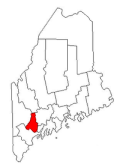|
Welcome to Androscoggin County Maine
Genealogy
Research
Golden Rocket
"Spring 1859" is not the date of
departure from Bangor, but of arrival at San
Francisco. The San Francisco newspaper,
_Alta California_, for 19 May 1859, p. 2f,
records the arrival on the previous day of
the ship "Golden Rocket", Pendleton, master,
from Boston 8 December 1858, 158 [in
reality, 161] days; among the passengers
listed are "C. Hellenbrand, Mrs.
Hellenbrand, Miss Josephine Hellenbrand, C W
N Hellenbrand". Concerning the voyage, the
_Alta California_ prints the following
"memorandum":
Was 68 days to Cape
Horn; 25 days off the Cape, with bad
weather, crossed the Equator in the
Pacific April 20th lon 109 W; then had
light winds to lat 35 N; since then had NW
winds; put in Juan Fernandez for water;
lay in port 2 days. Left there wh[aling]
b[ar]que Stella, of NB; wh[aling] b[ar]que
Afton, Allen, of NB; wh[aling] b[ar]que
Wavelet, Swain--all put in for supplies.
Ham[burg] ship Hebe, from Liverpool, for
this port, had touched and left on March
25th.
The _Alta California_ prints a list of the
cargo (which included, 2 boxes of pianos) on
p. 1c. The family probably sailed on to
Portland on the "clipper" barque "What
Cheer", William Metzger, master, which
sailed from San Francisco on 25 May 1859, or
on the mail steamship "Panama", which sailed
from San Francisco on 1 June. To determine
on what vessel the family sailed, however,
it shall be necessary to consult a
contemporary Portland newspaper. The
following account of the "Golden Rocket" is
taken from William Armstrong Fairburn,
_Merchant Sail_ (Center Lovell, ME: Fairburn
Marine Educational Foundation, [1945-55],
vol. 5, p. 3547:
No real clipper-ships were built at either
Bangor or Brewer, but toward the end of the
clipper shipbuiling decade of 1850-1859,
when no more extreme clippers--or merchant
sailing vessels built for speed alone--were
being laid down in any shipyard of the
United States, a so-called medium, or half,
clipper ship was built at Brewer, Maine, for
Moses Giddings and E. S. Dole, of Bangor.
This vessel, which was the little
full-rigged and rather heavily sparred ship
"Golden Rocket", was of 608 tons register,
and she was launched into the Penobscot
River in the fall of 1858. The ship sailed
from Bangor for Boston on November 11, 1858,
with a large number of passengers aboard,
and after loading at Boston, she cleared
that port December 8 for San Francisco,
where she arrived on May 18, 1859, after a
passage reported as 158 days [this time, one
of the fastest ever claimed for a voyage
between Boston and San Francisco, omits the
2 days spent in port at Juan Fernandez].
Captain Pendleton, of Searsport, was in
command on this westward passage around the
Horn, but he left the little ship at San
Francisco, and Captain Collins was appointed
master when she sailed for the West Coast of
South America to load guano. The "Golden
Rocket" had a short life, for on July 13,
1861 (when only two and three-quarters years
old), while on a voyage in ballast from
Havana to Cienfuegos under the command of
Captain Bailey, she was captured off the
Isle of Pines and burned by the armed
Confederate commerce raider "Sumter",
commanded by the famous Captain Semmes. The
"Rocket", at the time of her capture, was
beating to winward when intercepted by the
"Sumter". She [presumably the "Sumter"] was
flying the British flag until the vessels
were less than a mile apart, when the raider
displayed the Stars and Bars and fired a
shot across the bow of the astonished
"Golden Rocket". This was the first capture
of the "Sumter" and Captain Semmes' first
prize of the Civil War. The crew of the
"Rocket" was transferred to the "Sumter",
and the Yankee trader, with no cargo aboard,
was set on fire. Captain Semmes expressed
his sadist [sic, for saddest] sentiments
regarding the capture and destruction of the
"Golden Rocket" in the _Index_ of May 1,
1862, as follows: It was about 10 o'clock at
night when the first glare of light burst
from her cabin hatch. Few on board can
forget the spectacle. A ship set on fire at
sea! It would seem that man was almost
warring with his Maker! Her condition was
helpless--the red flames licking the rigging
as they climbed aloft, the sparks and the
pieces of burning rope taken off by the wind
and flying miles to leeward; the ghastly
glare thrown upon the dark sea as far as the
eye could reach and then the deathlike
stillness of the scene--all these combined
to place the "Golden Rocket" on the tablet
of our memories forever.
Courtesy of Michael P. Palmer
contributed by Marjorie Jodoin
© 1997
|
©
MEGenWeb All Rights
Reserved.
This site last updated:
|


